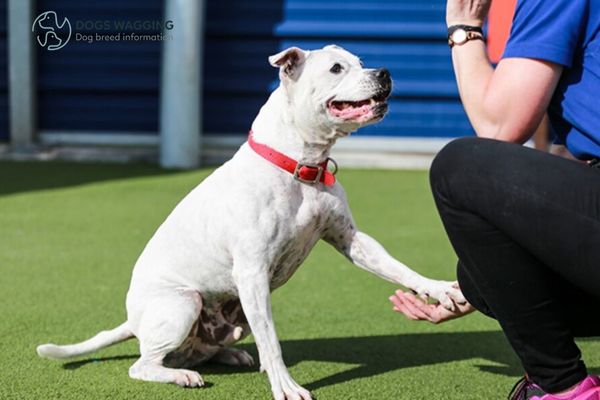John Switch • Wed Jan 03 2024
How To Train A Dog To Stop Barking: Top 5 Effective Training Tips

Barking is a natural dog behavior, but excessive barking can be challenging for dog owners and neighbors. Understanding the reasons behind barking and applying consistent training techniques can help manage and reduce unnecessary barking.
If you don't know How to Train A Dog To Stop Barking, this article will walk you through the steps to identify the cause of barking and implement strategies to train your dog effectively.
Why Do Dogs Bark?
Dogs bark for a variety of reasons—it's their primary way of communicating. Before you can effectively train them to reduce unnecessary barking, it's crucial to understand the different motivations behind this behavior, including:
- Communication: Dogs bark to communicate needs, warnings, or to show excitement.
- Attention Seeking: Dogs often bark when they want attention or something from their owners.
- Boredom or Loneliness: Lack of mental and physical stimulation can lead to excessive barking.
- Fear: Strange or loud noises, unfamiliar people or animals, or new environments can trigger barking.
- Territorial/Protective: Dogs may bark to alert or ward off perceived threats in their territory.
By recognizing the reasons behind your dog's barking, you can tailor your training to be more effective and address the root cause of their vocalization.
Preparing to Train Your Dog
Training your dog to stop barking is a commitment that requires preparation and understanding of your dog's habits and needs. Before diving into the training process, it's essential to set the stage for success. This involves:
- Observation: Note when, where, and what triggers your dog's barking.
- Consistency: Ensure all family members understand the training methods and remain consistent.
- Patience: Understand that training takes time, and every dog learns at their own pace.
By being well-prepared, you'll create a positive learning environment and pave the way for effective training sessions.
Basic Training Tips before Addressing Barking
Establishing this groundwork will not only facilitate easier communication but also strengthen the trust and bond necessary for successful behavior modification. These basic training tips will ensure that both you and your dog are well-equipped with the necessary skills and mindset to address and manage barking effectively.
- Obedience Training: Ensure your dog understands basic commands like "sit," "stay," and "quiet."
- Positive Reinforcement: Use treats and praises to reward your dog for obeying commands and remaining quiet.
- Exercise and Stimulation: Provide adequate physical and mental exercise to reduce boredom-related barking.
Top 5 Effective Training Methods for Dog to Stop Barking
There are five practical training tips that you can use to reduce the barking level of your furry companion. Each method will require patience, consistency, and positive reinforcement. You'll need to adjust your approach based on your dog's response and be prepared for this to be a gradual process.
Remember, the goal is not to silence your dog entirely but to reduce excessive barking that's problematic. Always approach training with the dog's wellbeing as a priority, and consider professional help if you're not making progress.
Desensitization
Identify what causes your dog to bark and slowly expose them to the stimulus. Begin at a level of intensity low enough that it doesn't provoke a barking response and reward them for their silence. Gradually increase the stimulus level (e.g., the volume of a sound or the proximity of a visual cue) while maintaining a calm, non-barking dog. It's a slow process but can be very effective in reducing reactive barking.
Teach The " Quiet" Command
It may sound paradoxical, but teaching your dog to bark on command can help teach them to be quiet. First, in a situation where your dog naturally barks, say "speak" and reward them for barking.
Once they understand the "speak" command, introduce the "quiet" command. When they bark in response to the "speak" command, let them bark 2-3 times, then say "quiet" and distract them with a treat or toy. When they stop barking to investigate the treat, praise them profusely. Eventually, they will learn to associate the word "quiet" with stopping barking and receiving a treat.
Remove Triggering Factors
Your dog gets some reward when they bark. Otherwise, they wouldn't do it. Figure out what they get out of barking and remove it. If they bark at people passing by the living room window, manage your dog's environment by closing the curtains or putting your dog in another room. If they bark at passersby when in the yard, bring them inside. Be consistent so they don't learn that barking sometimes works.
Provide Physical and Mental Exercise
A tired dog is a quiet dog. Ensure your dog gets plenty of physical exercise, as well as mental stimulation. A brisk walk or a game of fetch can significantly reduce barking behavior, as can mental challenges like training sessions or puzzle toys.
The proper amount of physical and mental exercise appropriate for your dog will depend on their age, breed, and health.
Use Bark Collars or Devices (with Caution)
In some cases, devices like bark collars, ultrasonic deterrents, or scent-based deterrents may be used to interrupt and reduce barking. These should be considered only after other methods have failed and used under the guidance of a professional. Be aware that inappropriate or overuse of these devices can cause fear or anxiety in your dog and should be a last resort.
FAQ - How to Train a Dog to Stop Barking
How Long Does It Take to Train a Dog to Stop Barking?
Training time varies depending on the dog's age, temperament, and the consistency of the training. Some dogs may respond quickly within weeks, while others might take longer.
Are Some Dogs More Prone to Barking than Others?
Yes, some breeds are more vocal and prone to barking due to their genetics and breed characteristics.
Can Older Dogs Be Trained to Stop Barking?
Yes, older dogs can learn to reduce barking, but patience and possibly adjustments to training methods are necessary, considering their age and health.
Conclusion
You are in trouble because your furry friend barks a lot, but you don't know How To Train A Dog To Stop Barking. To prevent this problem, you must understand the causes, apply consistent training, and be patient.
With the right approach and techniques, you can significantly reduce your dog's barking and enjoy a quieter, happier life together. Remember that barking is a natural behavior for dogs, and the goal is to manage it effectively, not eliminate it completely.

John Switch / Author
Hello this is a test author
Recent blog posts

John Switch • Sat Dec 30 2023
How To House Train A Dog: A Complete Guide
House training a dog is a fundamental step in creating a harmonious living environment for both the pet and the owner. It involves teaching your dog where a

John Switch • Tue Jan 02 2024
How To Potty Train A Dog: All Things You Should Know
Potty training is a fundamental aspect of bringing a new dog into your home, whether a puppy or an adult. It's about teaching your dog where and when it's a
 The Dog Are Barking
The Dog Are Barking Obedience Training A Dog
Obedience Training A Dog How To Train A Dog To Stop Barking
How To Train A Dog To Stop Barking A dog are playing a game of fetch
A dog are playing a game of fetch